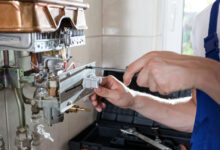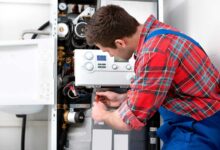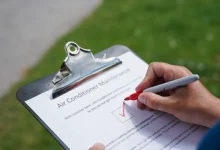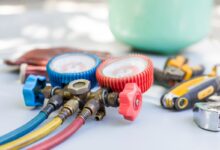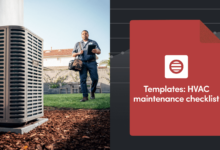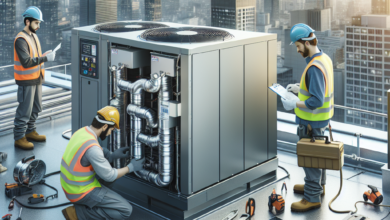HVAC Yearly Maintenance Cost
HVAC Yearly Maintenance Cost – When it comes to ensuring the longevity and efficiency of your HVAC system, regular maintenance is key. However, many homeowners are often left wondering about the cost implications of annual HVAC upkeep. In this blog article, we aim to provide you with a detailed and comprehensive guide on HVAC yearly maintenance costs, covering the importance of maintenance, routine tasks, common repairs and replacements, system efficiency, hiring professionals, DIY options, preventive measures, and budgeting considerations.
Importance of HVAC Maintenance
Regular HVAC maintenance is essential for various reasons. Firstly, it improves energy efficiency, ensuring that your system operates optimally and doesn’t consume excess energy. This translates into cost savings on your utility bills in the long run. Secondly, proper maintenance extends the lifespan of your HVAC system by addressing minor issues before they escalate into major problems. By catching and resolving problems early on, you can avoid costly repairs or premature system replacements.
Moreover, regular maintenance contributes to improved indoor air quality. HVAC systems accumulate dust, pollen, and other allergens over time, which can circulate throughout your home if not properly cleaned. By scheduling annual maintenance, you can have your system inspected, cleaned, and have filters replaced, reducing the presence of pollutants in your indoor air. This is especially crucial for individuals with allergies or respiratory conditions.
Enhancing Energy Efficiency
One of the primary benefits of HVAC maintenance is the enhancement of energy efficiency. When your system is clean and well-maintained, it operates more efficiently, consuming less energy to cool or heat your home. Regular maintenance tasks such as cleaning coils, checking refrigerant levels, and ensuring proper airflow all contribute to optimal system performance. This, in turn, reduces your energy consumption and lowers your monthly utility bills.
Extending System Lifespan
HVAC systems are a significant investment, and maximizing their lifespan is crucial for cost-effectiveness. Regular maintenance helps identify and address potential issues early on, preventing them from developing into major problems that can significantly impact the lifespan of your system. By replacing worn-out parts, cleaning components, and ensuring proper lubrication, you can keep your system running smoothly for years to come.
Improving Indoor Air Quality
A well-maintained HVAC system plays a vital role in maintaining good indoor air quality. Over time, dust, pollen, and other contaminants can accumulate in your system, leading to poor air quality inside your home. During HVAC maintenance, technicians will inspect and clean your system, removing any debris or pollutants that may be affecting your indoor air. Additionally, regular filter replacements are essential for trapping airborne particles and ensuring cleaner, healthier air for you and your family.
Basic HVAC Maintenance Tasks
To keep your HVAC system in top condition, certain maintenance tasks should be performed regularly. These tasks can be divided into two categories: those you can handle yourself and those best left to professionals. Let’s explore some of the basic maintenance tasks in each category to give you a better understanding of what’s involved.
Tasks You Can Handle
While some maintenance tasks require professional expertise, there are several things you can do yourself to keep your HVAC system in good shape. One of the simplest tasks is regularly replacing your air filters. Clogged or dirty filters can obstruct airflow and reduce system efficiency. By changing them every one to three months, depending on usage and filter type, you can ensure proper airflow and prevent debris from accumulating in your system.
Another DIY task is keeping the area around your outdoor unit clean and free of debris. Trim any vegetation or shrubs that may obstruct airflow or impede the unit’s operation. Clear away leaves, grass clippings, and other debris that may accumulate near the unit, as they can clog the system and affect its performance. Additionally, ensure that the unit is level and stable, as an unbalanced unit can lead to operational issues.
Professional Tasks
While some maintenance tasks can be handled by homeowners, it’s crucial to have professionals perform certain tasks to ensure the safety and optimal functioning of your HVAC system. One of the most important professional tasks is an annual system inspection. During this inspection, technicians will thoroughly assess your system, checking for any signs of wear and tear, leaks, or other potential issues. They will also perform tests to measure system efficiency and make recommendations for any necessary repairs or adjustments.
Cleaning the condenser coils is another task best left to professionals. Over time, these coils can accumulate dirt and debris, reducing system efficiency and potentially causing damage. HVAC technicians have the expertise and tools to safely and effectively clean the coils, ensuring optimal heat transfer and system performance.
Cost of Routine HVAC Maintenance
Now that we understand the importance of HVAC maintenance and the tasks involved, let’s delve into the costs associated with routine maintenance. The exact cost can vary depending on factors such as your location, the size of your system, and the extent of the maintenance required. However, we can provide a general overview of the average expenses involved in typical annual HVAC maintenance.
Inspection and Tune-Up
During an annual inspection and tune-up, HVAC technicians will thoroughly examine your system, checking for any signs of wear, leaks, or inefficiencies. They will assess the condition of various components, including motors, coils, electrical connections, and refrigerant levels. Technicians will also clean and lubricate moving parts, tighten electrical connections, and calibrate controls as necessary. An inspection and tune-up typically costs between $75 and $200, depending on factors such as system complexity and regional pricing variations.
Cleaning and Filter Replacement
Cleaning your HVAC system and replacing filters are crucial maintenance tasks that contribute to its efficiency and longevity. Cleaning the evaporator and condenser coils, removing debris from fan blades, and clearing drain lines are typically included in routine maintenance. Additionally, air filters should be replaced regularly to ensure proper airflow and prevent the accumulation of dust and allergens. The cost of cleaning and filter replacement can range from $75 to $150, depending on the complexity of the system and the number of filters involved.
Common HVAC Repairs and Their Costs
Despite regular maintenance, HVAC systems may still require repairs throughout their lifespan. Understanding the common repair issues and associated costs can help you anticipate and budget for potential expenses. Let’s explore some of the most common HVAC repairs and their average costs.
Thermostat Replacement
If your thermostat becomes faulty or inaccurate, it may need to be replaced. Thermostat replacements can range from $100 to $300, depending on the type and features of the new thermostat you choose.
Blower Motor Repair or Replacement
A malfunctioning blower motor can cause reduced airflow or even complete system failure. Repairing a blower motor may cost between $150 and $450, while a replacement can range from $450 to $1,200, depending on the motor’s size and efficiency.
Refrigerant Leak Repair and Recharge
If your HVAC system has a refrigerant leak, it will require repair and a recharge of the refrigerant. Repair costs for refrigerant leaks typically range from $200 to $1,500, depending on the location and severity of the leak. The cost of recharging the refrigerant can vary, but it is usually in the range of $150 to $350.
Compressor Replacement
The compressor is a vital component of your HVAC system. If it fails, the entire system may need to be replaced. The cost of compressor replacement can range from $1,500 to $2,500, depending on the size and efficiency of the unit.
Coil Replacement
Coils are responsible for heat transfer in your HVAC system. If they become damaged or corroded, they may need to be replaced. Coil replacements can range from $500 to $1,500, depending on the type and size of the coil.
Replacement Parts and their Expenses
Over time, certain HVAC components may need to be replaced due to wear and tear or damage. Understanding the costs associated with these replacements can help you plan and budget accordingly. Let’s explore some common HVAC replacement parts and their average expenses.
Condenser Fan Motor
The condenser fan motor is responsible for pulling air through the condenser coil to release heat. If it fails, replacing it can cost between $150 and $500, depending on the motor’s size and efficiency.
Evaporator Coil
The evaporator coil is responsible for absorbing heat from the air in your home. If it becomes damaged or corroded, it may need to be replaced. The cost of replacing an evaporator coil can range from $500 to $1,500, depending on the size and type of coil.
Condenser Coil
The condenser coil is responsible for releasing heat from the refrigerant. If it becomes damaged or corroded, it may need to be replaced. Replacing a condenser coil can cost between $500 and $1,500, depending on the size and type of coil.
Compressor
The compressor is the heart of your HVAC system, responsible for circulating refrigerant and facilitating heat transfer. If the compressor fails, it may need to be replaced. Compressor replacements can range from $1,500 to$2,500, depending on the size and efficiency of the unit. The cost of the replacement also depends on whether it is covered under warranty or if additional labor charges apply.
Thermostat
If your thermostat is no longer functioning properly or you want to upgrade to a more advanced model, replacing it can cost between $100 and $300. The cost may vary depending on the type of thermostat you choose, such as programmable or smart thermostats, and any additional features it offers.
Ductwork
If your HVAC system’s ductwork is damaged or poorly insulated, it may need to be repaired or replaced. The cost of ductwork repairs can range from $300 to $1,500, depending on the extent of the damage and the complexity of the duct system. Complete duct replacement can cost between $2,000 and $6,000, depending on factors such as the size of your home and the material used for the new ductwork.
HVAC System Efficiency and Energy Savings
Regular HVAC maintenance not only helps to keep your system running smoothly, but it also contributes to improved energy efficiency. An efficiently operating HVAC system consumes less energy, resulting in potential energy savings for homeowners. Let’s explore how regular maintenance can enhance your system’s efficiency and lead to long-term cost savings.
Clean Coils for Better Heat Transfer
Over time, dirt and debris can accumulate on your HVAC system’s coils, hindering proper heat transfer. During routine maintenance, technicians will clean the coils, ensuring optimal heat exchange between the refrigerant and the air. This allows your system to cool or heat your home more efficiently, reducing energy consumption and lowering your utility bills.
Optimized Airflow for Enhanced Efficiency
Proper airflow is crucial for your HVAC system’s efficiency. During maintenance, technicians will check and clean air filters, ensuring unobstructed airflow. They will also inspect and clean the blower motor and fan blades, removing any debris that may impede airflow. By maintaining optimal airflow, your system doesn’t have to work as hard to distribute conditioned air throughout your home, resulting in energy savings.
Sealed Ductwork for Reduced Energy Loss
Leaky or poorly insulated ductwork can lead to significant energy loss. During HVAC maintenance, technicians can inspect and seal any leaks in your ductwork, ensuring that conditioned air reaches its intended destination without escaping. Properly sealed ducts prevent energy wastage, allowing your system to operate more efficiently and reducing your energy consumption.
Efficient System Operation for Lower Costs
By addressing minor issues during routine maintenance, you can prevent major system malfunctions that can be costly to repair. Regular maintenance helps identify and resolve potential problems early on, minimizing the risk of system breakdowns and the associated repair expenses. Additionally, a well-maintained system operates more efficiently, consuming less energy and reducing your overall HVAC costs.
Hiring Professional HVAC Maintenance Services
While some HVAC maintenance tasks can be handled by homeowners, there are several compelling reasons to consider hiring professional HVAC maintenance services. Professionals have the expertise, experience, and specialized tools necessary to ensure thorough and effective maintenance. Let’s explore the benefits of hiring professionals and the associated costs.
Benefits of Professional HVAC Maintenance
Professional HVAC technicians undergo training and certification to handle various maintenance tasks. They have in-depth knowledge of HVAC systems and can identify potential issues that may go unnoticed by homeowners. Professionals also have access to specialized tools and equipment to perform tasks more efficiently and accurately. By hiring professionals, you can have peace of mind knowing that your system is in capable hands, and you can maximize its performance and lifespan.
Costs of Professional HVAC Maintenance
The cost of hiring professional HVAC maintenance services can vary depending on factors such as your location, the size and complexity of your system, and the service provider you choose. On average, you can expect to pay between $100 and $300 for a comprehensive annual maintenance visit. While this may seem like an additional expense, it is an investment that can save you money in the long run by preventing costly repairs and ensuring the efficient operation of your HVAC system.
DIY HVAC Maintenance and Associated Expenses
While professional HVAC maintenance is highly recommended, there are certain maintenance tasks that homeowners can handle themselves. DIY HVAC maintenance can be a cost-effective option, but it’s essential to understand the tasks you can safely and effectively perform. Let’s explore some DIY maintenance tasks and the potential expenses associated with them.
Changing Air Filters
One of the simplest DIY maintenance tasks is regularly changing your HVAC system’s air filters. The cost of air filters can vary depending on the type and quality you choose. Disposable filters typically range from $5 to $20 each, while reusable filters may cost between $20 and $100. The frequency of replacement depends on factors such as usage and the type of filter, but it is generally recommended to replace disposable filters every one to three months.
Cleaning Outdoor Unit and Vents
Keeping the area around your outdoor unit clean and free of debris is another DIY task that can contribute to the proper functioning of your HVAC system. You may need basic tools such as a garden hose, broom, or leaf blower to remove dirt, leaves, and other debris. The cost of these tools can vary, but they are relatively inexpensive and can be used for various other household tasks as well.
Inspecting and Cleaning Registers and Vents
Inspecting and cleaning the registers and vents inside your home is a simple DIY task that can improve system performance. You can use a vacuum or a brush attachment to remove dust and debris from the registers and vents. The cost of a vacuum or brush attachment will depend on the brand and model you choose, but they are generally affordable and can be used for other cleaning purposes as well.
Preventive Measures and Cost Savings
While regular maintenance is crucial, taking preventive measures can further reduce the likelihood of major HVAC issues and associated costs. By implementing simple practices and being proactive, you can save money in the long run. Let’s explore some preventive measures you can take to maintain your HVAC system and minimize expenses.
Regularly Change Air Filters
One of the most important preventive measures is regularly changing your air filters. Clogged or dirty filters restrict airflow and strain your system, leading to reduced efficiency and potential damage. By replacing filters as recommended by the manufacturer, you can ensure proper airflow, prevent dust buildup, and extend the lifespan of your HVAC system.
Keep Outdoor Unit Clear
Regularly inspect and clear the area around your outdoor unit to ensure optimal airflow. Trim vegetation or shrubs that may obstruct the unit and remove any debris that may accumulate, such as leaves or grass clippings. By maintaining a clear space around the unit, you allow for proper ventilation and prevent potential issues caused by overheating or restricted airflow.
Invest in Programmable or Smart Thermostats
Installing a programmable or smart thermostat can help optimize your HVAC system’s energy usage and reduce costs. These thermostats allow you to set specific temperature schedules, adjusting the heating or cooling levels when you’re away from home or asleep. By automatically adjusting the temperature based on your preferences, you can avoid unnecessary energy consumption and save on your utility bills.
Schedule Professional Maintenance Annually
While there are DIY tasks you can perform, it’s still essential to schedule professional HVAC maintenance at least once a year. Professional technicians have the expertise and tools to thoroughly inspect, clean, and tune your system, ensuring optimal performance. By addressing potential issues early on and maintaining your system properly, you can prevent major breakdowns and costly repairs.
Budgeting for HVAC Yearly Maintenance
Now that we have explored the various aspects of HVAC yearly maintenance costs, it’s important to consider how to budget for these expenses. By planning ahead and being financially prepared, you can ensure that your HVAC system receives the necessary maintenance without straining your budget. Let’s explore some practical tips for budgeting for HVAC yearly maintenance.
Research and Compare Maintenance Service Providers
Before scheduling professional HVAC maintenance, research and compare different service providers in your area. Look for reputable companies with positive reviews and competitive pricing. By obtaining quotes from multiple providers, you can compare costs and choose the option that best fits your budget.
Set Aside a Maintenance Fund
Consider setting aside a portion of your monthly budget specifically for HVAC maintenance. By allocating a small amount each month, you can accumulate funds over time to cover the annual maintenance costs. This approach prevents unexpected financial burdens and ensures that you have the necessary funds readily available when it’s time for maintenance.
Plan for Potential Repairs
In addition to routine maintenance, it’s important to plan for potential repair expenses. HVAC systems can develop issues that require professional intervention, and these repairs can be costly. By setting aside a separate emergency fund or including a buffer in your maintenance budget, you can be prepared for unexpected repair costs without impacting your overall financial stability.
Consider Extended Warranty Coverage
When purchasing a new HVAC system, consider investing in an extended warranty. While this may add to the upfront cost, it can provide peace of mind and financial protection in the long run. Extended warranties typically covercostly repairs and replacements, reducing the financial burden on homeowners. By including extended warranty coverage in your budget, you can mitigate potential expenses associated with major HVAC repairs.
Explore Financing Options
If you’re facing unexpected HVAC repair or replacement costs that exceed your budget, consider exploring financing options. Many HVAC service providers offer financing plans that allow you to spread out payments over time. This can help alleviate the immediate financial strain while still ensuring that your HVAC system receives the necessary maintenance or repairs it requires.
Regularly Assess and Adjust Your Budget
As with any budgeting strategy, it’s important to regularly assess and adjust your HVAC maintenance budget as needed. Take into account any changes in your financial situation, such as increased income or expenses, and adjust your budget accordingly. By staying proactive and adaptable, you can ensure that your HVAC system remains properly maintained without compromising your overall financial stability.
In conclusion, understanding the costs and considerations associated with HVAC yearly maintenance allows homeowners to plan and budget effectively. Regular maintenance is crucial for the energy efficiency, lifespan, and indoor air quality of your HVAC system. By performing basic maintenance tasks yourself, hiring professional services when needed, and implementing preventive measures, you can minimize potential repair costs and maximize system performance. Remember to factor in the cost of routine maintenance, potential repairs, and replacement parts when budgeting for HVAC yearly maintenance. By being proactive and financially prepared, you can ensure the optimal functioning of your HVAC system and enjoy a comfortable and energy-efficient home.
